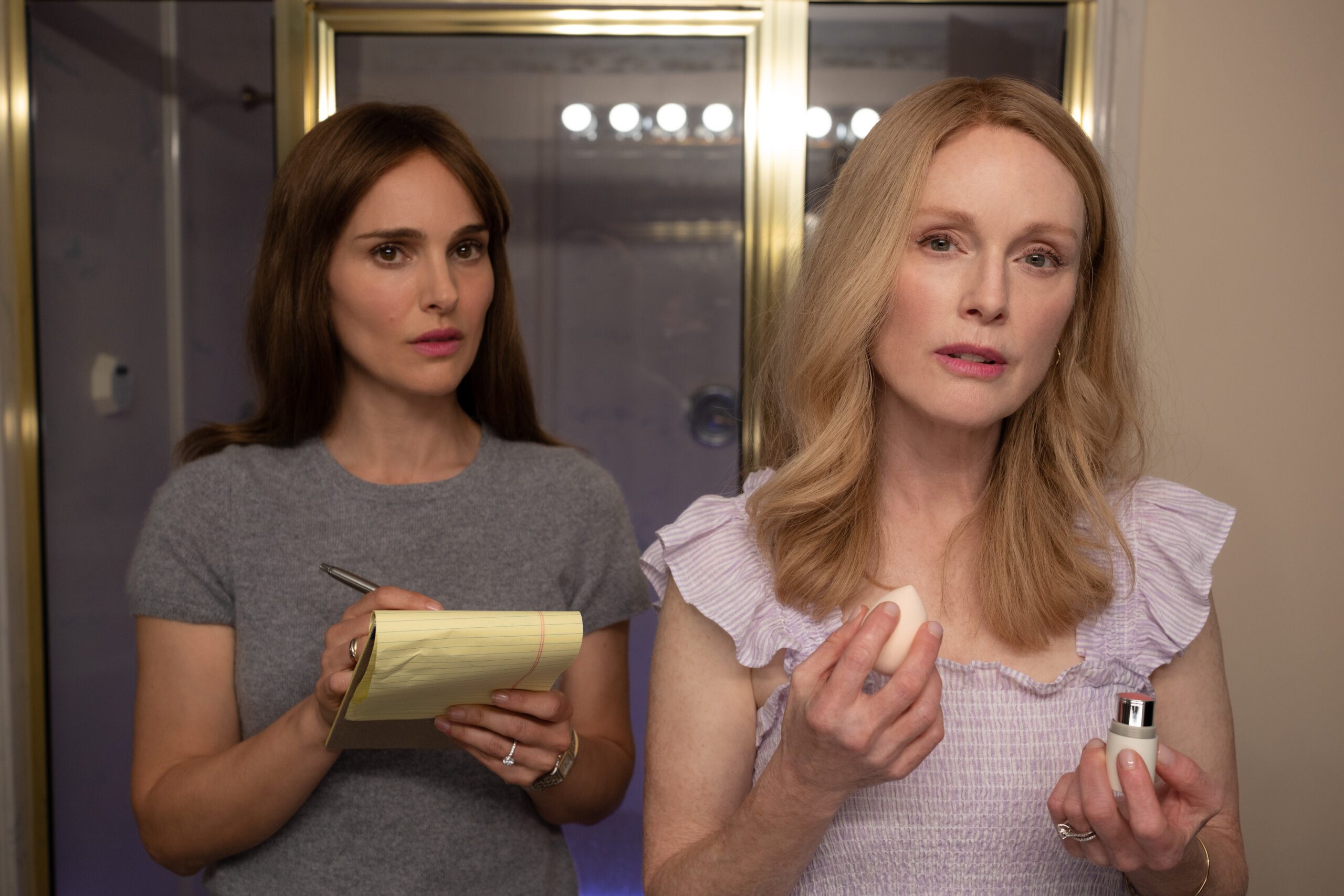There’s a lot to think about when the credits roll on Todd Haynes’s May December, his acidic melodrama written by Samy Burch about Gracie Atherton-Yoo (Julianne Moore), a housewife who became a ’90s tabloid fixture after grooming a 13-year-old boy, Joe (Charles Melton), who decades later is now her husband. Their marriage begins to go off the rails when Elizabeth Berry (Natalie Portman), an actress who will be playing Gracie in a film, comes to their hometown to research the couple and their children. Warning: if you haven’t seen May December, the below contains spoilers for the film.
But the first thing that can’t be forgotten after a first viewing is that lisp. Gracie speaks with it lightly at times, like an adorable quirk that underlines her continued innocence and naiveté in her situation. But when the lisp becomes more pronounced, it feels utterly sinister—Gracie uses it to justify her terrible behaviour and continues to manipulate the feelings of others around her, especially Joe. Think about the voice they use in Dune in order to control the actions of others. This is basically the Haynes camp version of that used to perfect effect.
The use of camp is something that has long peppered Haynes’s work from the Douglas Sirk-inspired Technicolor melodrama of Far From Heaven to the glittery glam rock of Velvet Goldmine to the literal Barbie-acted exploration of Karen Carpenter in Superstar. In her 1964 essay “Notes on ‘Camp’,” Susan Sontag described camp: “the essence of camp is its love of the unnatural: of artifice and exaggeration.” And that’s something that’s rooted in Haynes’s work, but also has consistently upended the idea of it to tell far more compelling emotional truths. And May December might be the pinnacle of his use of camp.
May December explores all the things that make camp great. It’s a stylish take on what initially feels like an upscale Lifetime movie—a slightly Vaseline-hazy camera lens, a ton of pastels, a triumphantly dramatic score, which underpins moments both hilarious (Gracie lamenting there aren’t enough hot dogs while prepping for a barbecue) and gutting (Joe turning his hobby of raising monarch butterflies into making connection with other people). And while this could be noted as just a fun aesthetic choice, one that bolsters the dark humour of the film, it’s one that says a lot more about where the characters exist emotionally.
The film is set in 2015—something that’s mentioned by date toward the end of the film. And it takes a minute to register because of the Lifetime pastels and baggy polo shirts of it all—it feels as though it’s been crystallized in the ’90s. That feeling is cemented when a montage of Elizabeth flipping through tabloids that document the media frenzy around Gracie and Joe when she was pregnant in jail with their child. And other smaller details create this aura—Elizabeth’s makeup commercial, the blond wood of the Atherton-Yoo home, Gracie’s pastel-hued wardrobe. But it’s also a specific, important emotional choice—the events have left them all frozen in time, emotionally stunted, unable or unwilling to move on.
There’s no better example of this aesthetic choice than when Georgie (Cory Michael Smith), Gracie’s son, is introduced to Elizabeth while singing in a shitty cover band at a bar. He certainly looks the part of a ’90s teenager—bleached hair, baseball T-shirt, layered charm necklaces, chipped black Carson Daly nail polish. He recalls, in staccato, about how he found out about Gracie and Joe the first time—his teenage birthday party the collateral damage. And in the way he reminisces about this, it’s easy to see how Georgie too, has become stuck in a timeline where he threw up after eating too many Warheads.
Georgie isn’t the only casualty in the wake of Gracie’s decision-making at age 36. But with Elizabeth coming to town to exhume Gracie’s troubled history—the sparring between Portman and Moore makes their emotional destruction hilarious. Their chemistry crackles as Elizabeth wedges her way into Gracie’s life, interrogating her friends and family, as Gracie becomes more and more closed off to Elizabeth mining her life. Some of the funniest bits come through Elizabeth’s research—Gracie insisting that her son has a calcium deficiency as she forces a huge glass of milk on him, calling her daughter brave for showing her arms. Haynes’s use of camp and melodrama milks and parodies the nature of acting to some of its funniest ends. When Elizabeth goes to the pet store stockroom and imagines a passionate tryst, with the coupling of the dramatic music, it’s a perfectly funny soap opera moment. But it’s also the turning point of the camp of the film, to unearth Elizabeth and Gracie’s manipulations of Joe, a man who has just been coasting by until the darkness is quite literally staring back at him through both women.
Gracie has manipulated and groomed Joe since he was a teenager—and that shows in Melton’s performance. When Elizabeth first comes into their home, he mostly grunts, and is prone to childlike reminiscing as he looks at old photographs and drinks beers while watching Bob Vila. But as Elizabeth’s research opens the cracks up in their marriage, Joe’s kind nature allows him to say things to Elizabeth about his relationship, and Gracie that the viewer can intuit he has never before vocalized. In turn, he begins acting out in small ways—illicit texts to a woman in his monarch-raising group, smoking weed for the first time with his son, sleeping with Elizabeth. But Joe’s transgressions aren’t so much as they are seeing a man who no longer fits within the margins of his own life. His attempts at emotional growth are sideswiped by both Gracie and Elizabeth. After he and Elizabeth sleep together, it’s clear she’s used him as part of her own research process, getting more information, including one of Gracie’s love letters that wasn’t destroyed. Portman then delivers a hell of a monologue of the lovelorn note to Joe, as Gracie (including the lisp), exhaling excitedly afterward. It’s a scene that shows how Joe was simply just a pawn for her to get to the something “real” that she’s looking for throughout the film.
It’s implied that Elizabeth is Joe’s only other sexual partner than Gracie, and after their tryst, Joe finally tries to confront his wife about their relationship. And Gracie turns it back to her. As Joe struggles to ask for what he needs from his wife, Moore goes into full steely victimhood. “You seduced me,” Gracie tells her husband, her lisp going all over the place, and giving Joe no answers as the scene is capped with a dramatic swell of the piano. There’s an ache for Joe in that moment, knowing that the film will give him no resolution, no easy out of his life with Gracie.
And that’s where camp becomes the most important tool in the arsenal of May December—it builds the drama of the film up into thinking it’s about one thing, which it most certainly is (tabloid culture, acting, “the truth”), but it all goes to showcase the broken heart of the film—Joe—who has been crystallized in amber since he was a 13-year-old boy, stuck in Gracie’s upside down pineapple cake suburbia wasteland, a butterfly who can’t get out.
May December is in theatres and streaming on Netflix now.


 Why you can trust Xtra
Why you can trust Xtra


